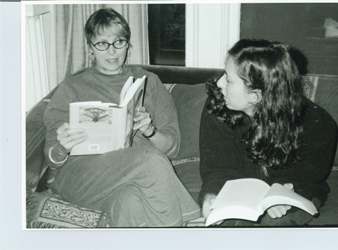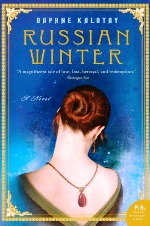Daphne Kalotay is the recipient of multiple writing fellowships and the critically acclaimed author of RUSSIAN WINTER, now available in paperback. Below, she shares a heartfelt story about her mother, Jill Kalotay --- who always knows exactly what to do.
Photo: Daphne, right, and mother Jill reading --- What else?
 I was four years old when my mother first signed me up for ballet class. This was no amateur operation, but rather the New Jersey School of Ballet. A year or so earlier, we had moved to the town of Madison, where my mother taught dance at a local university; perhaps she had aspirations of greatness for me, the first of two daughters.
I was four years old when my mother first signed me up for ballet class. This was no amateur operation, but rather the New Jersey School of Ballet. A year or so earlier, we had moved to the town of Madison, where my mother taught dance at a local university; perhaps she had aspirations of greatness for me, the first of two daughters.
Each Friday afternoon I slid into the back seat of our enormous silver-gray Oldsmobile, so my mother could drive me to class in the rain. Could it really always have been raining? Though my memory may be more emotionally than factually accurate, I truly don’t recall those Fridays any other way.
At the ballet school, we would head upstairs to a small communal dressing room, where my mother helped me into twisty pink tights and a leotard and flat leather slippers, and already I would be uncomfortable, aware of the other little girls around me being fitted into their own tangled tights by their own harried mothers, all of us too shy to acknowledge one another, though surely our mothers must have chatted. Then it was back downstairs to one of the studios, where we learned to plié and relevé and chassée, and moved our feet through first, second, third, fourth and fifth position, and applauded the teacher at the conclusion of each session. But I don’t recall particularly enjoying it. My focus was on the reward afterwards: a visit to a nearby sandwich shop with my mother, who drank hot black tea while I was allowed one of those little packets of orange-colored crackers that had peanut butter spread in-between.
I must have 
I was an extremely shy child, so to have any attention drawn to me was already painful. Over and over, each time I made a mistake, I heard my name called out and saw the displeasure on the teacher’s face, as the piano played a melody that began to sound more and more tragic. And then came the moment that I looked in the mirror and saw something even more troubling: My face was bright red.
Like most little children, I’d so far lived a life free of mortification, just gone blissfully about my existence. Embarrassment? I hadn’t quite known that such an emotion existed. And so when I looked in the mirror and saw my bright red face, I became immediately terrified. What was happening to me?
I felt my face growing hot and my eyes filling with tears. Behind me --- I could see in the mirror --- my mother sat with the other parents on metal folding chairs, watching this catastrophe take place. Seeing her there, I was seized with an overwhelming urge: Why am I still standing here, when my mother is over there?
As the piano continued its mournful tune, I turned and ran, straight into my mother’s arms. Up she lifted me, and carried me out of that horrible room, as I sobbed into her shoulder. “It’s all right,” she reassured me, the moment the door had closed behind us. We were in the fluorescent-lit hallway, and what my mother said next, which I now understand to be evidence of her Anglo-Canadian upbringing, at the time simply baffled me: “Don’t worry, we’ll go home and have some nice hot tea.”
How can hot tea could make anything better, I wanted to ask --- but I was too busy wailing into her sweater. But after all, it was one of those rainy Fridays, and what more can ever be offered, really, to counter the pain of humiliation, than some nice hot tea and sympathy? My mother of course knew --- as she still does --- exactly what to do.

